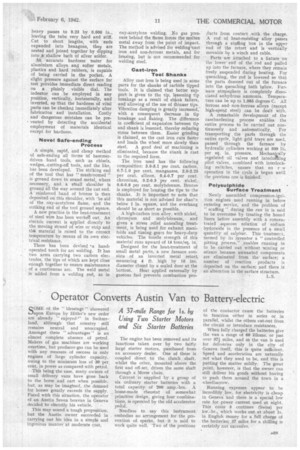Operator Converts Austin Van to Battery-electric
Page 25

If you've noticed an error in this article please click here to report it so we can fix it.
S014IE of the " blessings " showered upon Europe by Hitler's new order are already " enjoyed°. in Switzerland, although that country still remains neutral and unoccupied. Amongst thete " advantages " is an almost complete absence of petrol. Makers of gas machines are working overtime, but producer-gas can be used with any measure of success in only engines of large cylinder capacity, owing to the minimum loss of 30 per, cent, in power as compared with petrol.
This being the case, many owners of small delivery vans have gone back to the horse and cart when possible, but, as may be imagined, the demand for horses greatly exceeds the supply. Faced with this situation, the operator of an Austin Seven boxvan in Geneva decided to electrify his vehicle.
This may sound a tough proposition, but the Austin owner succeeded in carrying out his idea in a simple and ingenious manner at moderate cost. The engine has been removed and its functions taken over by two fairly large starter motors, purchased from an accessory dealer. One of these is coupled direct to the clutch shaft, whilst the other, mounted above the first and off-set, drives the same shaft through a Morse chain.
Current is sapplied by a group of Six ordinary starter batteries with a total capacity. of 200 amp.:hrs. A home-made rheostat of somewhat primitive design, giving four combinations, is operated by the old accelerator pedal.
-Needless to say this instrument embodies no arrangement for the prevention of. sparks, but it is said to work quite well. Two of the positions of the contactor cause the batteries to function either in series or. in parallel, whilst the others cut-out from the circuit or introduce resistances, When fully charged the batteries give the van a range of 60 Iiilorns. Cr just over 371 miles, and as the van is used for deliveries only in the city of Geneva itself, this is quite sufficient. Speed and acceleration are naturally not what they used to be, and this is putting the matter mildly. The great point, however, is that the owner can still deliver his goods without having to push them around the town in a wheelbarrow.
Running expenses appear to be incredibly .low, for electricity is cheap in Geneva and there is a:special low rate for power current used at night. This costs 5 centimes (Swiss) per kw.-hr., which works out at about Is. in English money for a full charge of the batteries; 37 miles for a shilling is certainly not excessive.




















































